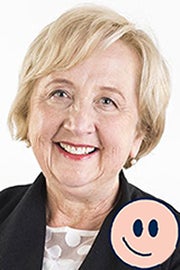What is your job?
My job is to stand up for the human rights of Australia’s children and young people, and to make sure that they get the help they need to be safe and well.
All children should have enough to eat, public transport, good health care, including for mental health, and a safe neighbourhood. They should be able to feel they belong and are supported in their family, their community and at school. They need time and space to enjoy activities like sport and music, and to play.
What do you do for children and young people?
I want to make sure children and young people have a voice in the issues that affect them.
I listen to find out what matters most to them and what their hopes and problems are. Then I tell the government and other decision-makers what children have said, so that laws and policies better protect their rights.
I also talk to community about children's rights in the media and in speeches, and I do research and write submissions to government. And I keep a close eye on children who need extra help, like children in detention or in out-of-home care.
What is the one thing you hear most often from children about their rights?
Children tell me they want their voices to be heard and their views taken seriously. I also hear that having a supportive family and school is really important for their wellbeing.
What do you love about your job?
The best part of my job is talking to children and young people from across Australia to hear their stories and ideas. I am often surprised by what they say. Hearing directly from children is important so I can tell governments what they need.
If you could do one thing for children in Australia, what would it be?
I would ask the Australian Government to make child safety and wellbeing a priority for National Cabinet and appoint a Minister for Children.
What do you like to do when you’re not working for children’s rights?
I love swimming and going to the beach with my family, watching Netflix, listening to music and hanging out with friends.


